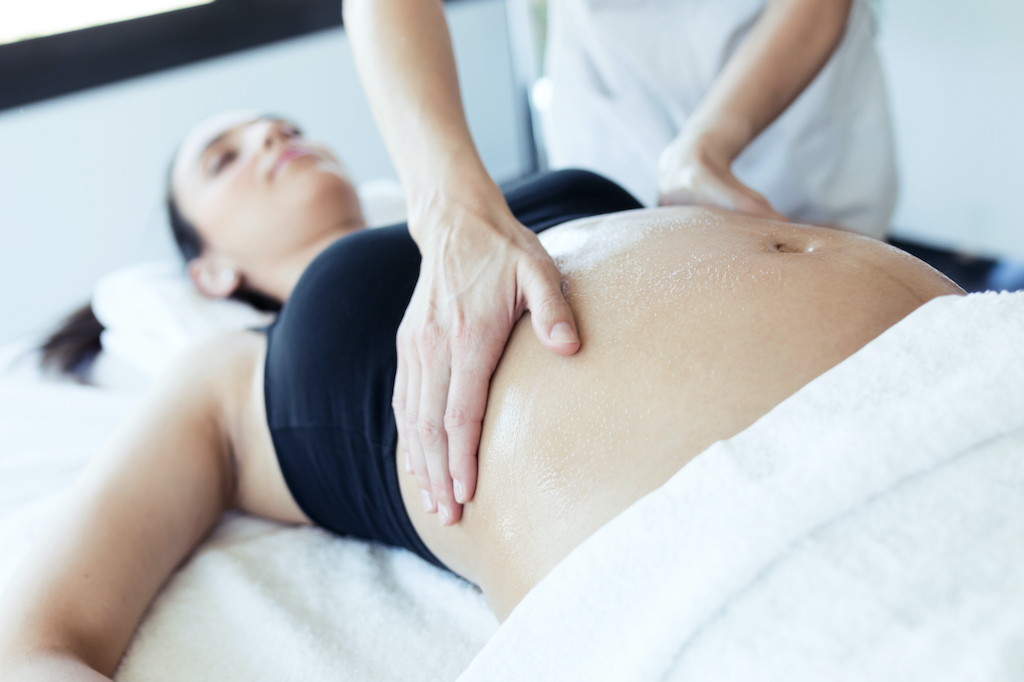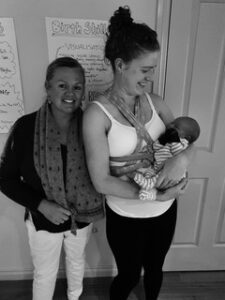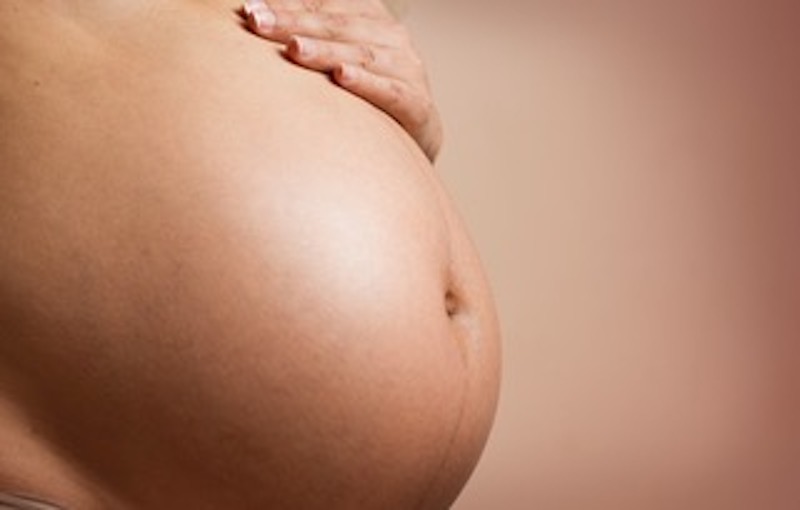Newly pregnant and heard the buzz about pregnancy massage benefits? Congratulations on your brilliant news – we’re excited for you!
Pregnancy is a special and exciting time. Nine months may seem a long time to wait to meet your little one, but we all know how quickly time flies – you will be holding your precious bubba in your arms before you know it.
So what’s next? What foods should you avoid? What kinds of tests will you and your baby need? Can you still exercise? How do you choose a doctor or hospital? What are your options? Is what you’re feeling normal?
The amount of information is overwhelming. And all of it feels vital. Pregnancy is a wonderful time but can also be the source of much apprehension and stress.
How do we deal with all of these essential questions and the many preparations that need to be made? How do we cope with the pressure we place on ourselves to already be the best parent possible for our unborn child?
Breathe…and just let our body do its thing. Be kind to yourself. One thing that is essential to put on your to-do-list is pregnancy massage. Read on to see how pregnancy massage benefits and nourishes your physical body and emotional wellbeing throughout the whole nine months of pregnancy.
What’s happening to your pregnant body?
Pregnancy affects the body in a variety of ways: physically, hormonally, emotionally, mentally. It has an impact on every system of the body.
1sT TRIMESTER
During the first trimester your body undergoes many changes. Hormonal changes affect almost every organ system in your body. These changes can trigger symptoms even in the very first weeks of pregnancy.
Pregnancy massage is safe in the first trimester but only with a specially trained therapist. Pregnancy massage can help relieve some of the common symptoms such as:
- Fatigue or extreme tiredness
- Nausea
- Mood swings
- Constipation
- Headache
- Heartburn.
Pregnancy massage will also assist in relieving pre-pregnancy aches and pains.
2nd trimester
Most women find the second trimester of pregnancy easier than the first. Often you have a renewed source of energy. You might notice symptoms like nausea and fatigue go away.
But other new, more noticeable changes to your body are now happening. Your abdomen expands as the baby continues to grow. And before this trimester is over, you will feel your baby beginning to move!
As your body changes to make room for your growing baby, pregnancy massage benefits include alleviating discomfort from aches and pains associated with: Back, hip, glute, abdomen, groin, sciatic, Carpal tunnel syndrome, oedema.
3rd trimester
You’re in the home stretch! Some of the discomforts you had in your second trimester will continue. Many women find breathing difficult and notice they have to go to the bathroom even more often. This is because the baby is getting bigger and is putting more pressure on your organs. Don’t worry, these problems will lessen once you give birth. Get excited — the final countdown has begun!
Pregnancy massage will help ease the discomfort and pain caused by:
- Shortness of breath
- Heartburn
- Oedema
- Insomnia
- Back/hip/glute/sciatic pain
- Pelvic girdle pain
- Pelvic instability.
How does pregnancy massage assist?
Pregnancy massage has a long history in many cultures around the world. In countries such as Japan and Mexico, massage during pregnancy and even labour is deeply embodied in the normal care of pregnant women.
Pregnancy is an amazing state of being for your body, constantly changing and growing and challenging you. Regular pregnancy massage benefits and nourishes your physical and emotional wellbeing through all of these changes.
Massage during pregnancy is modified to accommodate and support your changing body, to ensure you reap the benefits of massage safely.
Top 9 benefits of pregnancy massage
- MOTHER-BABY CONNECTION
During your pregnancy massage we can use visualisations and breathing techniques to promote and grow your connection with your baby. We can also use massage directly on the belly for a physical connection, to help blood circulation in the abdomen and promote that pregnancy glow.
- INCREASED RELAXATION – REDUCED ANXIETY
Pregnancy massage can assist in reducing anxiety and stress in two ways – physically and emotionally.
Physically pregnancy massage is applying treatment to the muscles and tissues of the body to soften them, encourage healing and reduce pain levels. This brings about a feeling of increased relaxation and calmness.
Emotionally a pregnancy massage allows space for the mother to be calm and focused, remove herself from her busy day-to-day life, close down her thoughts and just be in the moment.
- IMPROVED SLEEP PATTERN
Pregnancy massage acts on the nervous system, helping to soothe and relax nervous tension.
When muscular pain and discomfort is reduced through pregnancy massage, the mother will be more comfortable in bed and will be able to sleep more easily and more deeply,
- REDUCTION IN OEDEMA
Pregnancy puts a lot of pressure on your upper and lower limbs. Swelling can occur in the feet, ankles, calves, hands and forearms. Massage can help relieve this pain and swelling by aiding the lymphatic system and flushing this excess fluid from the body. Removing the lactic acid and other cellular waste products from your system also reduces muscle cramping and muscle fatigue.
- EASES PAIN AND DISCOMFORT
Muscular conditions common in pregnancy involve the back, shoulders, neck, joints, buttocks, legs and arms – just about the whole body. Pregnancy massage will reduce musculoskeletal pain, cramping, tension and stiffness. It can alleviate headaches, oedema, leg cramps, sciatica.
Pregnancy massage can treat complex conditions and presentations such as carpal tunnel syndrome, pelvic girdle pain and pelvic instability.
- STABILISES HORMONAL CHANGES AND BLOOD PRESSURE
Pregnancy massage is a wonderfully natural way to aid circulation and the extra work of the heart during pregnancy. In turn this keeps the blood pressure in check.
Pregnancy massage works to eliminate waste products through the lymphatic and circulatory systems which combats fatigue so you feel more energetic. By improving the condition of the smooth muscles this normalises venous function and outflow. Better outflow, greater vitality; less fatigue, better nourishment for baby.
Pregnancy hormones cause many changes to the mother’s body, including depression and anxiety. Pregnancy massage benefits include relief from these negative effects and promote a more positive outlook for the pregnancy.
- EASE SHORTNESS OF BREATH
As your baby grows and takes up more room in your abdomen, there is less room for your diaphragm and lungs. This can cause shortness of breath and even pain in the ribs. Pregnancy massage treats directly into the intercostal muscles of the rib cage and uses deep breathing techniques.
- IMPROVED BODY AWARENESS TO SUPPORT BODY CHANGES
During pregnancy your body is constantly changing and needs to be supported throughout each trimester and during labour.
Pregnancy massage promotes overall body awareness. With regular treatments you will develop an understanding of your body, the origins of your pain and ways to self help.
Pregnancy massage benefits not only include tension release in muscles, it helps to realign your posture, improve your range of motion and increase your flexibility. This is especially important during the third trimester and in preparation for labour.
- BIRTH PREPARATION FOR THE BODY AND MIND
Be proactive about preparing for labour by tapping into your inner resources of strength and mindfulness. Regular meditative breathing brings calmness and control, accessing your energy and focus; excellent skills to have in your labour toolkit. Pregnancy massage promotes visualisation and breathing techniques that you can use in preparation for labour.
Pregnancy massage helps your awareness and understanding of your pelvic space which helps prepare for healthy birthing. By working on your posture, strength and flexibility, your baby can find the best position for birth.
During labour, massage reduces the stress hormones and tension that interfere with the normal process of birth. You can improve your chance for a shorter and positive labour with less need for interventions and medications.
Pregnancy massage is a lush and lovely way to help your body ripen and prepare for birth.
NURTURED BIRTH PREGNANCY MASSAGE
In Australia, certified pregnancy massage therapists receive training beyond the national standards for massage therapists. They understand the pregnant body and how to address specific needs in pregnancy.
Our therapists are all trained and certified in massage and pregnancy massage, registered, insured and have a special interest in caring for women from fertility and conception, through pregnancy, during labour and postnatally.
We have a range of specialist practitioners and supports to help with any particular issue that may arise during your pregnancy. Apart from pregnancy massage we also offer osteopathy, naturopathy, doula care, childbirth education, prenatal yoga, mums & bubs yoga. If your problem is outside of our scope of treatment we will refer you to one of our recommended practitioners.
Imagine going through pregnancy feeling relaxed emotionally and physically. Pregnancy massage relaxes tension in your body, reducing aches and pains in muscles and joints. This improves your mood and comfort. You sleep better and your skin glows.
How frequently you have a pregnancy massage depends on you, as each woman and pregnancy is unique. If you want massage to be a central part of your pregnancy care, we suggest you talk to one of our knowledgeable practitioners to find out what would best suit you. We can tailor massage therapy with our osteopath to ensure your body is well supported during the challenges of pregnancy.
Put yourself into the hands of experienced therapists with extensive knowledge of pregnancy and labour. Your treatment will be tailored especially for you.
WE ARE OPEN FOR BUSINESS AT NURTURED BIRTH FOR ALL YOUR PREGNANCY RELATED NEEDS
PREGNANCY MASSAGE – REMEDIAL AND RELAXATION
OSTEOPATHY
DOULA
NATUROPATHY
YOGA – PRENATAL, MUMS & BUBS
GIFT VOUCHERS AND PREGNANCY PRODUCTS
Nurtured Birth offers pregnancy massage at The Mother Baby Centre at Cabrini Hospital in Malvern and our clinic in Windsor.
To begin nourishing your body and mind, please contact us or book your appointment online today.





















